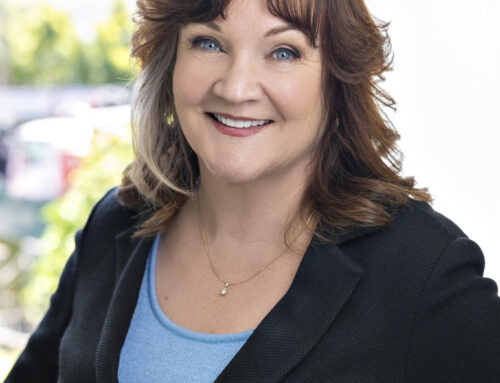Start-up entrepreneur merges traditional food and medicine with innovative mycology
![]()
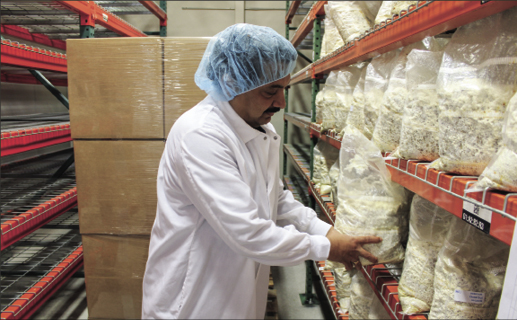
Nirmal Nair, founder and CEO of Sempera Organics, inspects processed mushroom product at the start-up’s facility in Morgan Hill.
Photo courtesy Sempera Organics
By Calvin Nuttall
In a nondescript facility tucked away off Church Street in Morgan Hill, a pioneering mushroom operation is cultivating fungi for a new frontier.
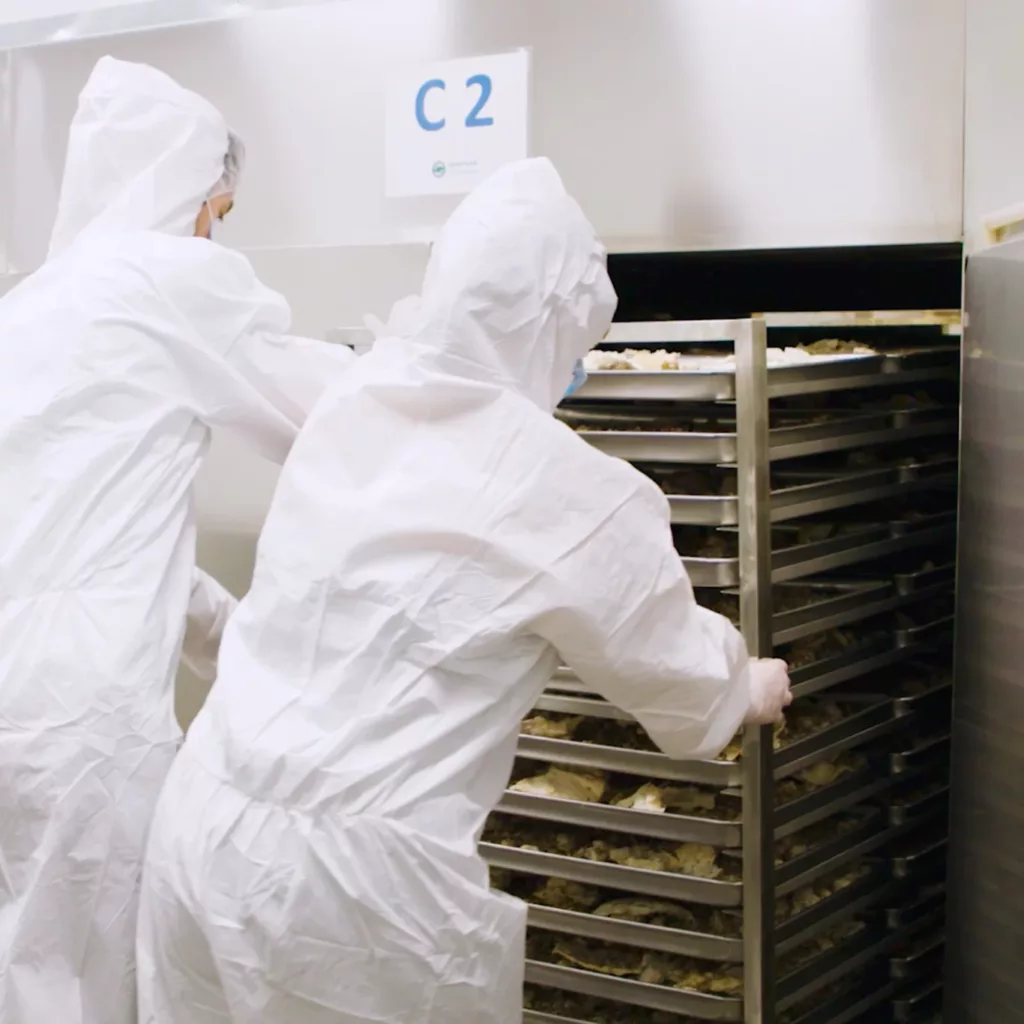
Photo courtesy Sempera Organics
Headed by founder and CEO Nirmal Nair, Sempera Organics is a cutting-edge mushroom ingredient producer. A trained mechanical engineer and experienced business developer and marketer, Nair left the Silicon Valley industry with the goal of putting his experience to work on his true passion: health and wellness, and in particular mushrooms.
“That was the genesis of the journey, and of Sempera,” Nair said. “I did my stint in high-tech and then decided I wanted to take on a large project that has a direct impact on our health and wellness.”
The start-up is vertically integrated: part lab, part indoor farm, and part manufacturing. In their controlled environment, they carefully fine-tune the nutritional content of their mushrooms for sale as both food and “nutraceuticals,” a category of dietary supplements meant to ascribe implied medicinal benefits to foods.
“Mushrooms are getting out of your medicine cabinet and into everyday food, because of how good they are for us,” Nair said. “We are playing that market by supplying brands with very high-quality and bioactive mushroom ingredients. We grow it here, we process it, and we ship it in bulk to brands.”
“Bioactive” is a term given to any compound that has an effect on living organisms, and commonly used in the dietary supplements industry to imply a scientific basis to unproven claims of nutritional value.
“Bioactive means it is good for your body and it does something positive,” Nair said. “What we do here is create products that positively impact conditions like immunity. It boosts your immunity, increases cognition, reduces stress, improves your gut biome, to name a few.
Bioactive mushrooms are a highly active area of research, Nair said. Sempera Organics aims to provide a scientific basis for their claimed nutritional benefits.
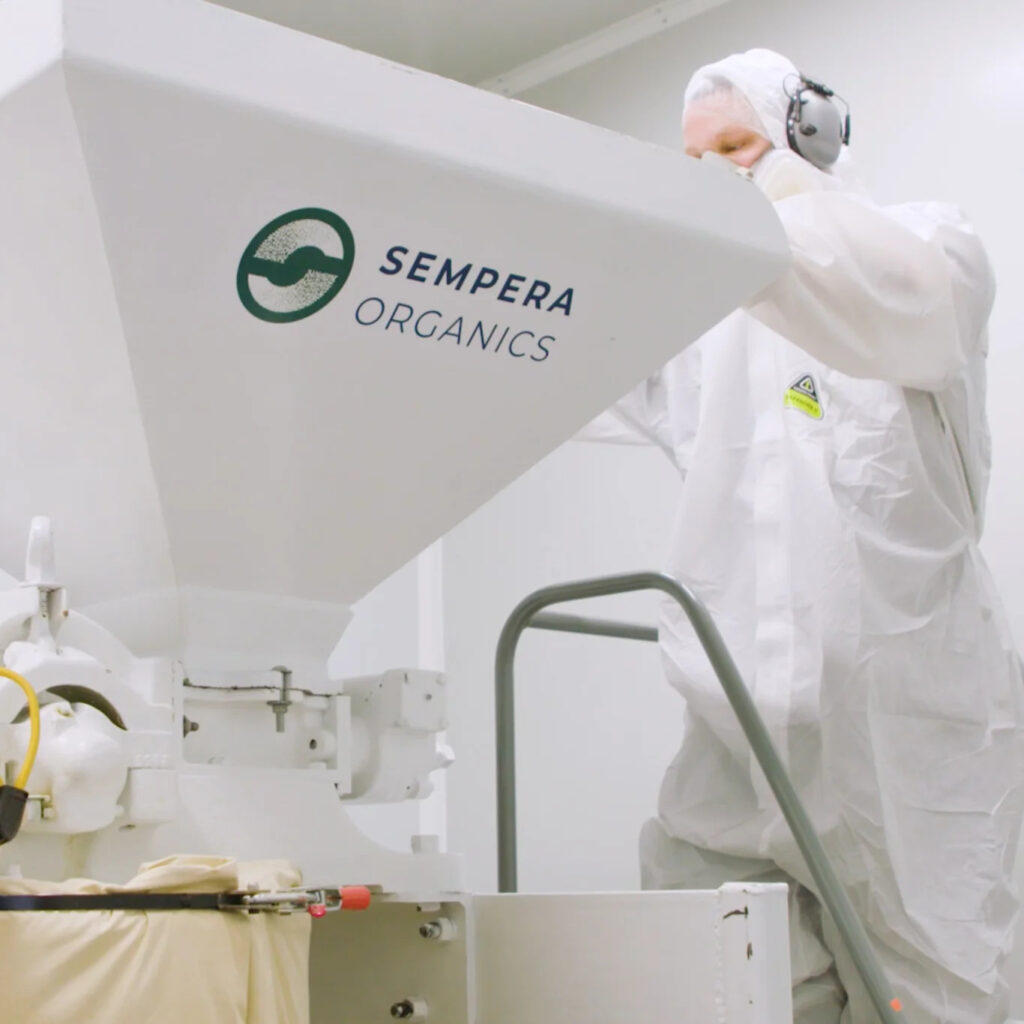
Photo courtesy Sempera Organics
“Most mushrooms have yet to be discovered,” he said. “But (their value was) known in ancient cultures. When you go to Asia or to Europe, culturally people have been having mushrooms both for nutrition and for wellness. Sempera is a science-driven company, so we are getting to the ‘Why.’ That brings us to the bioactives.”
Their focus on bioactive compounds is one way in which Sempera Organics differentiates itself from traditional mushroom growers. They also differ in methodology, using a proprietary lab-based growing method they claim speeds production by 40 percent over traditional methods, and which also captures bioactive compounds from the fungal mycelium that usually aren’t present in products that contain only the fruiting body of the fungus.
“When you walk in, this is not a mushroom farm. It doesn’t look like one. It doesn’t behave like one,” Nair said. “You don’t see compost. That is because of the approach we have taken.”
Nair’s heavy emphasis on a scientific backing is a major part of Sempera’s branding. Instead, he has focused on building a repertoire of credentials and certifications, including USDA Certified Organic, GMP (Good Manufacturing Practice) Certified, and Certified Made in California, and others.
“Since we are selling to businesses, they want to know what’s behind (our product),” Nair said. “They don’t want just another name, because there are options for them. We had to be different. It is about delivering on the promise. Getting the certifications, getting organic, getting cGMP. That itself is the foundation, that itself is the brand.”
In addition to producing nutraceuticals, the company also makes mushrooms for good old-fashioned eating. Typically, Nair said, mushrooms in Western cuisine appear as a side-dish, a garnish, or one ingredient in a stew or similar complex meal. His goal is to bring mushrooms to the center of the plate, by developing a new cuisine product he calls “Mamu.”
“Mamu is a food base, and you can make almost anything out of it,” he said. “The word itself, ‘Mamu,’ is a shortened form of ‘umami.’ Umami is that savory fifth taste our tongue recognizes that is present in meat. It is what makes our tongue want meat. Meat has it naturally, and mushrooms do as well. As such, by calling it Mamu, our focus is leading with taste. When it comes to food, taste matters the most.”
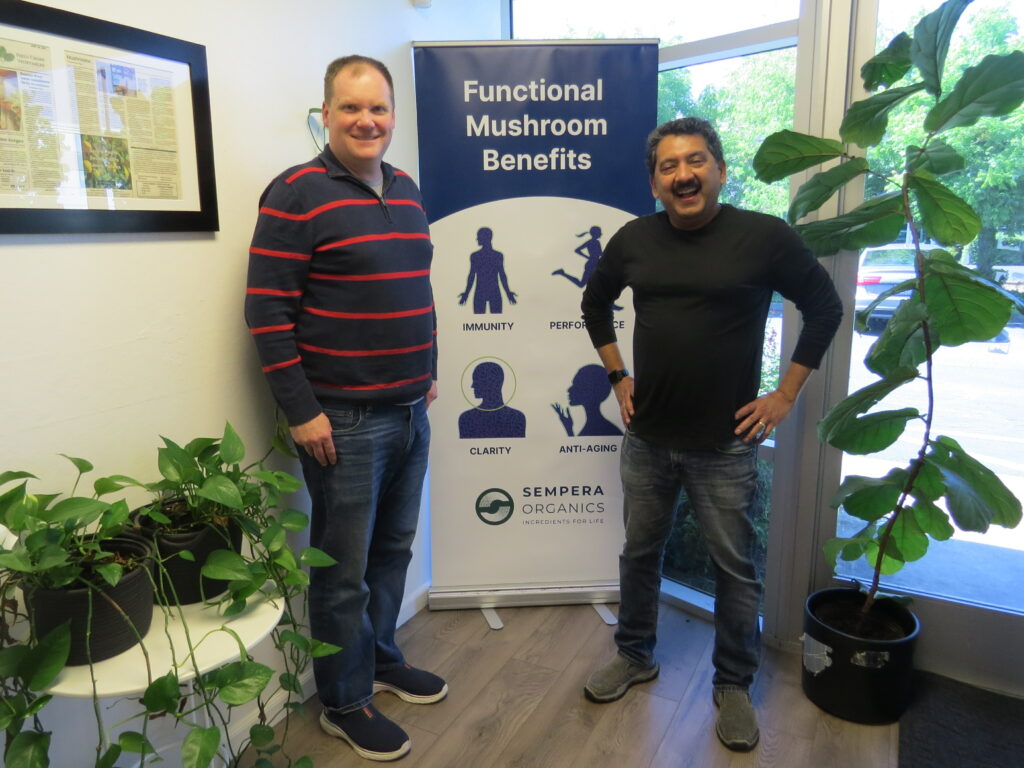
Mike Wargocki (left), in charge of scaling up production, and CEO Nirmal Nair stand in front of a lobby sign describing the benefits of mushrooms. Photo by Marty Cheek
The main ingredients of Mamu are button, shitake, and king oyster mushrooms, combined with chickpeas, to produce a versatile food similar in consistency to ground beef. The formula was developed to be similar enough to meat that it can receive similar treatments, allowing it to be substituted in place of meat.
“It’s stuff we’ve all eaten,” Nair said. “The three mushrooms in it are the three most popular mushrooms in the world. We wanted to create a product everybody knows, that is easy to explain. We want to offer it in shapes and forms that consumers recognize. They may be thinking, ‘Today I want to eat less meat. What is a possibility that doesn’t seem like a punishment?’”
Mamu is delivered frozen in bulk to restaurants, including downtown Morgan Hill’s own Craft Roots, a popular vegan restaurant, where it becomes their “Mamu the Greek” burger.
“You can marinate it, bake it, roast it, pretty much any operation you would do with real meat,” Nair said. “We call it the third pillar of food. You have plant-based, you have animal-based, and you have fungal-based, like mamu. We are excited about where it could go, and we have big ideas and big ambitions.”
Sempera Organics had its genesis in 2019 and evolved during the early days of the COVID pandemic.
“It was a very strange time,” Nair said. “I initially bootstrapped the company, so we had very limited cash, and as a startup you’re running on fumes every day. So you have a lot to prove very quickly.”
 Despite this, Nair couldn’t have picked a better place to start his business. Not only is Morgan Hill the “Mushroom Capital of the Western United States,” but he found its business environment and community welcoming even during the trying period of the pandemic.
Despite this, Nair couldn’t have picked a better place to start his business. Not only is Morgan Hill the “Mushroom Capital of the Western United States,” but he found its business environment and community welcoming even during the trying period of the pandemic.
“Morgan Hill is kind of the right size. It is a small city, and a lot of passionate people live here,” he said. “Everything is close by. If I did not have a Home Depot a mile and a half away, things would look very different. We were able to go from zero to production in 90 days.”
Now, Nair is looking to the future and scaling up production. He foresees a massive market where fungi compose a larger share of the American diet, displacing meat with a more sustainable alternative that improves health.
“Mushroom awareness is booming, and this is just the beginning,” he said. “There is a big movement where people are realizing we should just go back to nature.”
Calvin Nuttall is a Morgan Hill-based freelance reporter and columnist.





